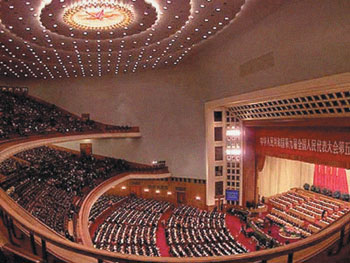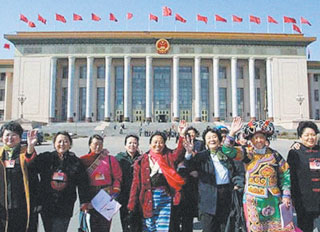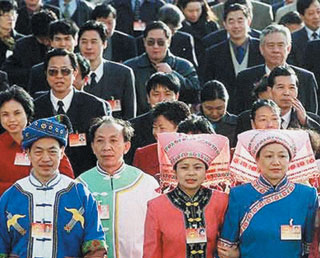
Some lawmakers from southwest China's Sichuan Province have submitted a motion to the National People's Congress, proposing the prompt enactment of the Law on Safety in Operations.
Liu Xiaofeng, a NPC deputy and deputy director of the Sichuan Provincial Department of Communications, pointed out that a major reason for the frequent occurrence of accidents in operations is that China's laws and regulations do not contain explicit provisions on how to severely penalize the people held responsible.
He claimed that only by managing safety in operations according to law, standardizing the production order, ensuring the laborers' safety and health, and investigating and punishing those held responsible for accidents will serious accidents be able to effectively prevent from occurring.
Background
To date, China has not had a special law regarding management of safety in operations, Liu said.
Consequently, management in this regard has to go by regulations and rules on various industries, as well as departmental documents, he said, adding that these are usually not severe enough to violators.
Enactment of Legal Assistance Law Proposed
Wei Yuerong, a NPC deputy, has proposed to the National People's Congress (NPC) that the Legal Assistance Law be enacted promptly to improve the legal assistance system.
Wei said the new law should state in precise terms that governments at all levels shall provide an organizational and financial guarantee for the enforcement of the legal assistance system.
The legal assistance system is an important legal system to ensure that citizens enjoy equal and impartial legal protection, improve the social security system, and perfect the human rights guarantee mechanism. It is through legal assistance that many poor, sick and handicapped people have safeguarded their own legitimate rights and interests.
Background
Wei is a doctor with the Traditional Chinese Medicine Hospital in Guiping, the Guangxi Zhuang Autonomous Region.
At the end of 2000, China had 1,912 legal assistance agencies and the cases handled via legal assistance have been on the increase year by year, she said.
Better Protection of Teenagers Studying Abroad Urged
CPPCC member Chang Cheng called on education departments to take effective measures to protect Chinese children who are studying or want to study abroad. Many of the teenagers studying in foreign countries are too young to control themselves and need better protection. With a growing number of young Chinese about to head for foreign schools, many foreign educational organizations have lowered their enrollment standards insgroupsto attract more Chinese students. But quite a few intermediary organs, driven by lust for money, present a false picture to cheat parents who want their children to become a talent. With their parents far away, some children who are too young to have a good control of themselves failed to behave properly in foreign countries. Some even committed suicide.
Chang called for scrutiny of the background, credit and educational level of foreign educational agencies which plan to enroll primary and middle school students from China, so as to avoid violation of contracts and fraudulence.
He suggested that government departments concerned reach agreements with their foreign counterparts on related issues such as the right of jurisdiction and Intermediary organs must undergo thorough examination and lawbreakers must be dealt with according to law.
Background
Statistics show that the number of Chinese teenagers studying abroad grew at an annual rate of 40 percent in the last three years. The number is expected to reach 50,000 this year and exceed 100,000 by 2005.
NPC Deputy Proposes Law on Genetically-Engineered Medicines
A law on the management of genetically-engineered medicines needs to be enacted to promote and systematically standardize the research, development, utilization and transfer of China's genetically-engineered medicines as well as the management of production, sales and safety of such products, according to a motion filed jointly by asgroupsof NPC deputies headed by Prof. Kong Fanchao, president of the mathematics and physics college of Anhui University.
He suggested that the state take an active attitude toward the R&D of genetically-engineered medicines while being cautious concerning the commercialization of such production.
Background
Chinese scientists have developed gene-transferred test-tube cows, which carry human serum protein genes and can produce milk containing human serum protein. At present, at least 15 varieties of genetically-engineered medicines are on sale in China.
In the United States, however, more than 50 kinds of genetically-engineered medicines are on sale, and 350 are under examination and approval and 2,200 other are being developed.
Foreign Investment in China Tops 400 Billion US Dollars
China had made use of foreign investment of over 400 billion U.S. dollars by February 2002, the Ministry of Foreign Trade and Economic Cooperation said Wednesday.
By February this year, China had approved the setting up of 393,988 overseas-funded businesses, with contractual foreign investment totalling 756.74 billion U.S. dollars, of which 401.1 billion U.S. dollars had been used.
In the first two months of this year, China approved the setting up of 3,963 overseas-funded businesses, a year-on-year growth of 23.65 percent.
During the same period, the total contractual foreign investment reached 11.45 billion U.S. dollars, up 24.41 percent, and the used foreign investment was 5.87 billion U.S. dollars, an impressive 28.37 percent increase.
Formulation of Anti-Excessive Profit Law Urged
China should formulate and enact the Anti-Excessive Profit Law to uphold a normal market economic order, prevent fraudulent price behavior and protect the legitimate rights and interests of investors and consumers, proposed by Ma Damou, a deputy to the National People's Congress from northwest China's Shaanxi Province.
Ma, vice-chairman of the Standing Committee of the Shaanxi Provincial People's Congress, said, "Using illegal means to make exceedingly high profits in a short period of time constitutes the act to make excessive profits."
Background
Various phenomena of making profits on the commodity and capital markets have not only brought losses to the life and property of consumers, but also have damaged the credit foundation of the whole society and disrupted the normalsgroupsof a market economy.
Say no to Foreign Garbage
Xie Taijian, an NPC deputy from south China's Guangdong Province, urged to take urgent actions to keep away garbage from developed countries. In 2001, customs in the province uncovered a large amount of imported garbage including used tires, clothes, home appliances and computers. Some companies are importing foreign wastes aiming to make a profit while ignoring laws and rules on environmental protection. "We have noticed the entry and are preparing to enact laws to ward off foreign garbage," Guangdong Governor Lu Ruihua said.
Background
It is estimated that more than 500 million tons of toxic wastes were produced around the world, a growing portion of which being transferred to developing countries. In recent years, various kinds of garbage from developed countries have kept flowingsintosChina via different channels. During the last Spring Festival in February, Taizhou Customs in Zhejiang Province detected 466.66 tons of household garbage which mainly consisted of used ring-pull cans and plastic film.
Such a danger has aroused the attention of Chinese lawmakers, now attending the annual session of the National People's Congress.
Speeding up Development Along Eurasian Continental Bridge Proposed
Mr. Guo Jiemin, an Xinjiang NPC deputy, proposed to speed up the development of the economic belt along the Eurasian Continental Bridge as part of the Great Western China Development Strategy.
Guo said that the central government has invested heavily in the building and transformation of the Eurasian Continental Bridge since the 1990s, greatly boosting the hauling capacity of the major sections of the railway.
He urged the central government to work out development plans and corresponding policies and start a number of key projects along the railway.
He also brought forward the suggestion of cooperating with tourism companies to take advantage of the tourism resources along the continental bridge to turn themsintostourism areas.
Guo is the director of the Urumqi Railway Administration in Northwest China's Xinjiang Uygur Autonomous Region.

TV Stations Urged to Consider National Interests in Opening Columns
Wang Xueping, a deputy of the National People's Congress, China's top legislative body, criticized some TV stations for excessively publicizing celebrities in the cultural sector.
For instance, CCTV opened the "Artistic Life" column but why it has not opened "Scientific and Technological Life" and "Devotion Life"?
This question should not be neglected. China is still a backward country. TV stations ought to encourage people to work hard and be dedicated to their careers and publicize more model people in science and technology and the people who are dedicated to their careers. In this way TV stations will help people, especially young people and teen-agers, to develop a correct value of making progress instead to be encouraged to worship film stars, singers, and so on.
CPPCC Member Proposes Law to Fight Family Violence
China should enact a law to curb domestic violence so as to make families real cells of social stability, Wu Changzhen, the member of National Committee of the Chinese People's Political Consultative Conference (CPPCC) and an expert in marriage law said in the Fifth Session of the Ninth CPPCC National Committee. She is considering putting forward a proposal for such a law during the session. The spreading family violence is posing an increasingly serious threat on social stability in China. Children, the elderly, especially women are major victims of family violence.
The CPPCC member attributed the increase in such cases to the enrooted traditional concept of the "authority of the husband to control the wife," drastic changes in social relations that cause psychological instability of the people, and the fact that multiple understanding of lifestyle has widened interpersonal differences.
Traditionally, Chinese regard family violence as domestic affairs or even domestic shame that should not be made public. Today, more and more women victims of family violence turn to divorce their husbands, or seek help from relatives and legal support, a survey carried out by Beijing-based Jiangfeng Women's Hotline shows.
Background
More than 40 countries and regions in the world have laws and regulations on family violence and more than 20 localities in China have similar regulations, all of which can be taken as reference for drafting a national law to contain domestic violence.
A recent survey shows that the number of domestic violence cases rose by 25.4 percent in China between the 1980s and 1990s. The latest statistics indicate that some 20 percent of Chinese families have the problem of domestic violence. Related departments in Beijing dealt with more than 120,000 disputes last year. Among them, 17 percent, or more than 22,000 of the cases, involved family violence.
Extending the International Labor Day and National Day holidays
To boost the economy, the government should extend the International Labor Day and National Day holidays from seven to nine days, said Li Shutian, a deputy tithe legislative National People's Congress (NPC). During the May Day holidays last year, more than 73.8 million people traveled, but 67.8 percent of them just took short-distance treks. For a person in northern China to travel to the south by train, he or she will have to spend at least four days on the way, and will thus have little time for sightseeing. With extended vacation, tourists can have more leisure time for sightseeing, and they can plan their trips more easily.
Tourism and related industries have boomed since the government enacted seven-day holidays during the May 1 Labor Day, October 1 National Day and Chinese Lunar New Year periods in 1999. More public holidays enable the Chinese to have more free time and they can choose varied life styles.
Background
A practice that has pleased millions of Chinese but perplexed others since 1999 -- when three national holidays were each extended to last a week.
In 2001, the number of domestic tourists reached 180 million in the three weeklong holiday periods with tourism revenue totaling 73.6 billion yuan. The two figures accounted for 23 percent and 14.7 percent of the year's total respectively.
Wage Law yearned for
China should formulate and enact the Wage Law as soon as possible to protect laborers' legitimate rights and interests, according to Chen Dapeng, a deputy to the National People's Congress, China's top legislature. With the Labor Law in place, workers will be able to protect their rights and interests and those employers defaulting workers' wages will be punished.
The professor accused those internationally defaulting workers' wages as committing murders in a disguised form.
Background
The phenomenon of deliberately defaulting workers' wages is becoming rampant in many places. Some enterprises, institutions and even foreign-funded companies are doing so to infringe workers' rights and interests, said Chen, a professor with the Southwest China University.
Wu Chengxun, deputy to the 9th NPPCC said the teachers in Songyang Primary School, Yingshang County, Anhui Province, haven't got their salaries for 8 months. He even found such cases happened in many places he visited personally. Foe instance, Xinglong County, the most prosperous county in Chengde City, Hebei Province, up to RMB17 million yuan that should be paid to teachers hasn't been paid since April, 2001.
Insurance Law Should Be Amended
China's Insurance Law should be to get in line with international practices and adapted to the new conditions after China becomes a full member of the World Trade Organization (WTO), said He Jingzhi, deputy to the Ninth National People's Congress (NPC), the top legislature of the country.
The NPC deputy, who is president of China Life Insurance Company Shanghai Branch, said as one of the first domestic industries to be opened to foreign capital, the insurance sector will face tough challenges arising from China's WTO entry, and a good law is badly needed to regulate the marketsgroupsin line with WTO rules.
She said that some stipulations in the Insurance Law adopted in 1995 obviously differ from international practice, such as the supervision mode, investment channels and the interpretation of some professional terms.
The existing stipulations on specific insurance businesses are restrictive to domestic companies' development of insurance products and competitiveness, leaving them in a poor position in international competition.
In addition, some stipulations restricting the use of capital hamper the development of insurance companies as well. Insurance companies should be allowed to invest through more channels for profits, which is also an international practice.

Law on Recycling Wastes Suggested
China needs a law on cyclic use of refuse which is of vital importance to the sustainable development of the national economy, said Zhu Tan, a deputy to the Ninth National People's Congress (NPC), China's top legislative body. Zhu said that at present, China badly needs to establish a circulation system so as to make the best use of resources in the production-consumption-waste-reproduction cycle.
Zhu, a professor with the Nankai University, said that urban wastes contain many usable substances which include more than 30 percent waste paper, and a large amount of ferrous and non-ferrous metals, plastics, glass and fabrics. If one million tons of the waste paper are used in paper making, 600 square kilometers of forest can be saved. He urged that a special law must formulated to promote the recycling of wastes in China, as it has been done in some developed countries such as Germany, Japan and the United States.
Background
Statistics show that more than 150 million tons of garbage is produced in Chinese cities annually, and the amount is rising by nine percent a year. But only less than 10 percent of the wastes have been re-utilized, and the total amount of garbage waiting for treatment has exceeded seven billion tons across the country.
| ![]() 本网站由北京信息港提供网络支持
本网站由北京信息港提供网络支持


